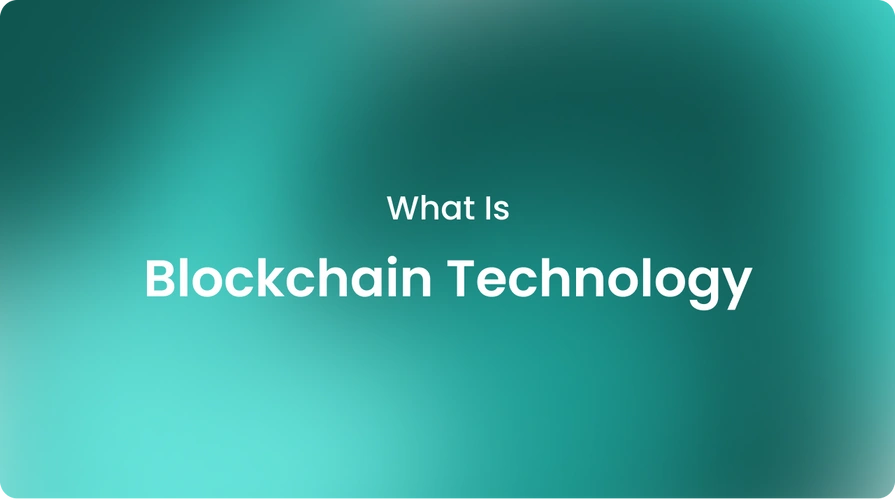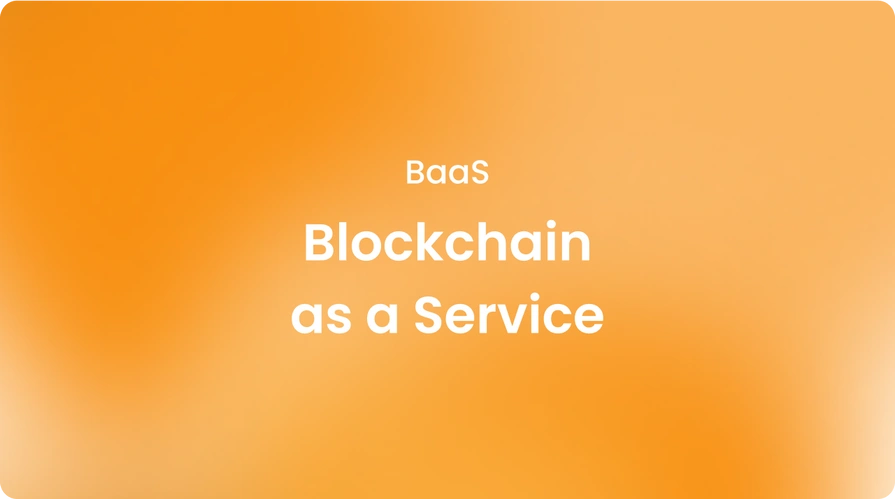|technology, knowledgehub
How Does Blockchain Work?

Blockchain technology has captured the imagination of innovators across industries, promising more secure, transparent, and efficient ways of transferring value, and you may wonder, “How does blockchain work?”.
While financial applications like cryptocurrencies receive much attention, blockchain's true potential lies in solving challenges outside of fintech. Let's examine the creative applications of this distributed ledger technology in addressing real problems across various sectors!
A blockchain is a decentralized digital public ledger of transactions maintained across a network of computers. It bundles each transaction into a block, time-stamps it, and cryptographically links it to the previous block, forming an immutable chain with crypto mining.
This structure allows participants to validate transactions without central oversight. A consensus mechanism adds new blocks, ensuring permanent recording of transactions. Therefore, the whole blockchain process is highly decentralized and secure.
What is blockchain technology?
Blockchain technology is a way of storing data in a secure, verifiable way across a network of participants. Blockchain provides innovation across many industries, including finance, with blockchain payment solutions.
At its core, there are five key elements of blockchain—a distributed database, peer-to-peer transmission, transparency with cryptography, irreversibility of records, and computational logic—that together create a universal, continuously updated blockchain public ledger. Let's break each part down!
What are the five elements of blockchain?
For blockchain to function as intended, there are five essential elements that must be present.
Here are the five elements of blockchain:
Distributed database
A network of computers stores blockchain data instead of a single location. You can check “Types of blockchain nodes” for more information.
Peer-to-peer transmission
Network users can directly interact with each other without an intermediary through decentralized finance.
Transparency
Transactions within the blockchain network are publicly visible, though user identities remain anonymous.
Irreversibility of records
After recording a transaction, it cannot be reversed; only additional transactions can be recorded on top of the existing ones.
Cryptographic security
Blockchain uses cryptography to secure transactions, control the generation of units of currency, and verify the transfer of assets.
What are the four types of blockchains?
When considering practical blockchain applications, there are four fundamental models for deployment based on access rights and levels of permission.
Here are the types:
Public
Anyone can read, send transactions, and participate in the consensus mechanism process, such as PoW, PoS, and PoA. You can check out “Proof-of-work vs. proof-of-stake” for a detailed comparison of each consensus mechanism.
Private
Permissioned with known nodes that validate transactions. Blockchain nodes enable the whole system to function securely and properly.
Consortium
Governed cooperatively by a group of institutions.
Hybrid
Both public and private blockchain ledger aspects exist in various configurations. Each has its own benefits for the system.
How many blockchains are there in the world?
There are more than 8,000 blockchains in the world. Additionally, there are now potentially thousands of public and private blockchain networks in operation worldwide. Some key figures:
- Bitcoin is still the largest and most well-known public blockchain network, accounting for around 40% of the total crypto asset market.
- Ethereum remains the second largest, with over $170 billion in total value locked and a vibrant developer ecosystem using its smart contract functionality.
- Industry analysts tracking blockchain projects claim there are anywhere from 4,250 to 13,000+ unique blockchain networks globally as of 2023, both public and private.
- Major tech giants also employ private blockchains for supply chain, data, and financial applications internally across their businesses.
So, while public awareness mainly revolves around cryptocurrencies, blockchain technology is proliferating at the enterprise level on both permissioned and private platforms too. Its applications are constantly diversifying and will continue to have transformative effects in the future too.
A world of possibilities with 8,000+ blockchains
With over 8,000 blockchains now in existence, according to some estimates, the opportunities for entrepreneurs and developers have never been greater.
Powerful platforms like Ethereum continue to attract major users across industries as interest in decentralized applications explodes.
Blockchain technology easily integrates innovations into our everyday lives. The blockchain's potential for exponential growth offers a world of possibilities.
Is blockchain trustworthy?
When implemented correctly with robust security protocols like those of Cryptobunq, blockchain ledgers have revealed themselves to be almost impossible to hack due to their decentralized nature.
Node consensus and cryptographic signatures ensure the integrity of each transaction beyond any possibility of tampering. This makes blockchain significantly more secure than traditional centralized databases, which are prone to cyberattacks and human error.
Cryptobunq is a one-stop-shop crypto service provider that utilizes blockchain-powered solutions for individuals and businesses. From tokenization to node-as-a service solutions, you can rely on CBQ. CBQ is an expert CaaS, NaaS, BaaS, and WaaS solution provider with the power of blockchain technology.
Is blockchain safer than banks?
Blockchain removes this peripheral risk by eliminating central points of failure and storing data across many redundant nodes. Therefore, the short answer is yes, blockchain is safer. Blockchain has proven itself to be one of the safest ways known to digitally store and transfer value.
Crypto wallets provided by companies like Cryptobunq offer “checkbook-level” control via multisignature security while maintaining customer-controlled private keys, something many banks still can't provide reliably. You can check out our custody and wallet solutions to secure your crypto assets.
How does blockchain solve business problems?
By providing an open, distributed ledger that is both transparent and secure, blockchain technology has the potential to help companies address some of their stickiest challenges.
Here is how blockchain solves business problems:
Supply chain management
Supply chain management is the coordination and oversight of all activities involved in the production and delivery of a product or service.
Tracking items from raw materials to finished goods at a low cost with enhanced traceability. Smart contracts automate conditional processes.
Settlement/clearing
Real-time clearing and settlement for financial transactions like equities and crypto payments between counterparties. Crypto service providers like Cryptobunq enable cross-border payments with cryptocurrencies and stablecoins, such as EURK stablecoin.
Identity management
Self-sovereign identity solutions prevent fraud, empower customers with control over personal data, and streamline Know Your Customer (KYC) or Anti-Money Laundering (AML) processes. You can check “KYC and AML” for further details.
IoT integration
IoT and industrial IoT are powerful innovations that collect and verify sensor data from devices for power applications in areas like predictive maintenance, quality control, and usage-based insurance.
Intellectual property
Timestamping digital files on the blockchain registers ownership of creative work, designs, and inventions in an indelible public record. This ownership feature protects rights and makes blockchain safer. You can check out “crypto custody” and “types of custody in crypto” for more information.
How can I use blockchain for my business?
The great news is that blockchain innovation is accessible even to small businesses through exchange API integration partners like Cryptobunq. You can take advantage of blockchain's strengths, even if you are not a tech company, by:
- Accepting crypto payments via euro stablecoins like EURK to open new markets and growth opportunities.
- Issuing and managing loyalty points or digital rewards on the blockchain for increased customer engagement.
- Tracking high-value assets or the authentication of luxury goods to combat counterfeiting.
- Powering smart contracts for auto-invoicing, payments, and other business processes requiring predetermined rules.
- Storing sensitive documents or records privately via centralized and decentralized storage systems with identity access management.
Companies of any size can streamline operations, cut costs, and deliver new value through a range of plug-and-play solutions by utilizing blockchain for business. With strategic partners, the benefits of this powerful technology are within your reach. Cryptobunq is here to be your expert partner!
The bottom line
As this overview of blockchain technology illuminates, decentralized ledger technology promises not just incremental improvements but dramatic paradigm shifts across multiple industries.
Companies willing to experiment and push the boundaries of this technology stand to gain tremendous competitive advantages by moving early to harness its potential.
With user-friendly platforms now emerging and blockchain integration made practical through APIs, the opportunities for business model transformation have never been greater.
For entrepreneurs and corporations alike, blockchain points the way towards a future of digitally native commerce with unprecedented security, efficiency, and transparency.
Exciting times are ahead as this innovative new technology layer continues to mature; the benefits to those who adopt it early could be immense and long-lasting.
If you want to explore how to use blockchain in your business, Cryptobunq would be an excellent partner to turn to. As a crypto-friendly digital bank, Cryptobunq offers crypto wallets, crypto solutions, and crypto batch payments—all designed to help companies leverage the power of blockchain.
With CBQ, you have a one-stop shop for integrating blockchain and accessing tools to grow your business in exciting new ways. Contact us and start to explore our innovative solutions to integrate crypto services into your business. Adapt to the future with Cryptobunq!













